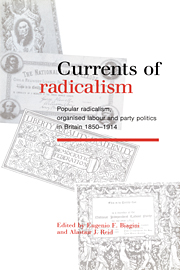 Currents of Radicalism
Currents of Radicalism from Part I - Continuities in popular radicalism
Published online by Cambridge University Press: 07 September 2010
For mid-Victorian radicals, the Tichborne cause was the farcical sequel to the heroic and democratic politics of the 1830s and 1840s. Whereas previous radicals and workers were concerned with such movements as Chartism and Owenism, many in the new generation were devoted to the less egalitarian task of restoring the property of a long lost aristocrat. We do not know how one contemporary radical, Karl Marx, felt but it is unlikely he approved.
Similarly, historians have tended to reflect the desperation of George Potter and Charles Bradlaugh who complained that so much working-class energy was devoted to such a worthless cause. Tichborne has barely rated a mention in historical accounts of this period although, as David Kynaston has pointed out, the 1870s are an ‘under-researched decade’. There have been several books on the case but they have scarcely affected the prevailing historiography. On the face of it, this is understandable; in many respects, the Tichborne cause was absurd. And yet the relative silence among historians ignores the fact that Tichborne was one of the largest (if not the largest) popular movements between the end of Chartism and the development of socialism and independent Labour politics in the 1880s and 1890s. Between 1872 and 1886 some 250 Tichborne associations were formed all over the country. In 1875, 283,314 people signed petitions in support of the Claimant. For Thomas Wright, he was ‘the best-beloved or most-grieved-over personage in the country’.
To save this book to your Kindle, first ensure no-reply@cambridge.org is added to your Approved Personal Document E-mail List under your Personal Document Settings on the Manage Your Content and Devices page of your Amazon account. Then enter the ‘name’ part of your Kindle email address below. Find out more about saving to your Kindle.
Note you can select to save to either the @free.kindle.com or @kindle.com variations. ‘@free.kindle.com’ emails are free but can only be saved to your device when it is connected to wi-fi. ‘@kindle.com’ emails can be delivered even when you are not connected to wi-fi, but note that service fees apply.
Find out more about the Kindle Personal Document Service.
To save content items to your account, please confirm that you agree to abide by our usage policies. If this is the first time you use this feature, you will be asked to authorise Cambridge Core to connect with your account. Find out more about saving content to Dropbox.
To save content items to your account, please confirm that you agree to abide by our usage policies. If this is the first time you use this feature, you will be asked to authorise Cambridge Core to connect with your account. Find out more about saving content to Google Drive.